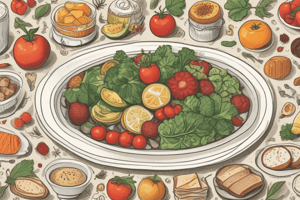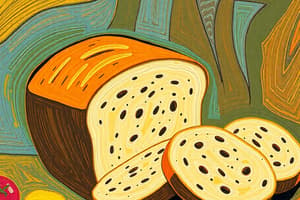Podcast
Questions and Answers
What is a common characteristic of a meal, regardless of the occasion or culture?
What is a common characteristic of a meal, regardless of the occasion or culture?
- Formal atmosphere
- Specific timing
- Multi-course menu
- Portion of food (correct)
What type of meal is typically eaten in the morning?
What type of meal is typically eaten in the morning?
- Lunch
- Breakfast (correct)
- Supper
- Dinner
What is a significant social aspect of meals?
What is a significant social aspect of meals?
- Fostering competition
- Encouraging overeating
- Bringinging people together (correct)
- Promoting solitude
What is an important consideration for a meal to ensure overall health and wellbeing?
What is an important consideration for a meal to ensure overall health and wellbeing?
What is a potential consequence of a meal with poor nutritional quality?
What is a potential consequence of a meal with poor nutritional quality?
Flashcards are hidden until you start studying
Study Notes
Definition and Types
- A meal is a portion of food eaten at a specific time and occasion
- Can be formal or informal, depending on the occasion and culture
- Types of meals:
- Breakfast: first meal of the day, typically eaten in the morning
- Brunch: combination of breakfast and lunch, often eaten on weekends or holidays
- Lunch: mid-day meal, often eaten at work or school
- Dinner: main meal of the day, typically eaten in the evening
- Supper: light meal eaten in the evening, often informal
- Snack: small, informal meal eaten between main meals
Cultural Significance
- Meals often have cultural and social significance, bringing people together and fostering community
- Can be an important part of religious and cultural celebrations
- Meals can also be a symbol of hospitality and generosity
Nutritional Importance
- Meals provide essential nutrients and energy for the body
- A balanced meal should include a variety of food groups, such as:
- Protein (e.g. meat, fish, eggs)
- Complex carbohydrates (e.g. whole grains, fruits, vegetables)
- Healthy fats (e.g. nuts, avocados)
- Meals can also impact overall health and wellbeing, with research linking meal quality to chronic diseases such as obesity and diabetes
Studying That Suits You
Use AI to generate personalized quizzes and flashcards to suit your learning preferences.




